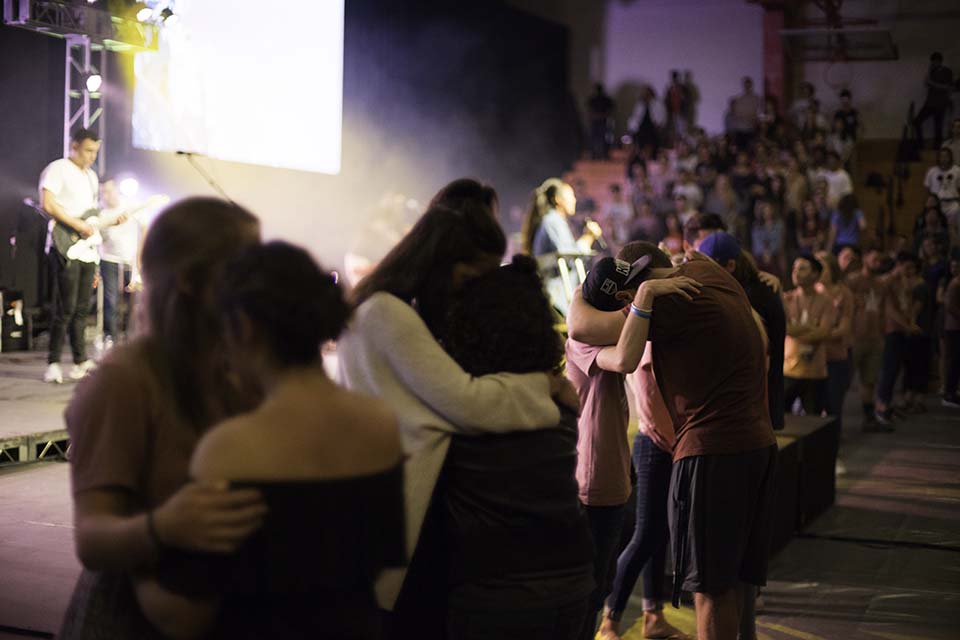As students attended the first day of Missions Conference, they valued the spread-out sessions more than being able to complete five sessions in one day.
A slower pace
Conference directors changed the schedule, requiring students to attend at least two days of conference to receive their conference credits. They hoped this would allow students to be more intentional throughout the conference, rather than rushing through the first day. Although several students initially felt frustrated by the change, most came to enjoy the slower pace of the first day.
“I understand how it has pros and cons because I know a lot of people try to finish all in one day but I feel like it’s better that they split it up that way because I know a lot of people that have gone to three today and three tomorrow,” said Lauren Chang, sophomore music major. “So it’s more spread out and I feel like then they’re exposed to a lot more stuff and I think it’s just better.”
Kings Kaleidoscope returned to Missions Conference for the second year in a row, as requested by the Student Missionary Union staff. Although there was some consideration about whether or not the band would be able to fit it into their tour, the band decided to return to Biola, much to the delight of students.
“We totally love it here and we had a really good experience last year. It’s pretty formative in some ways,” said Chad Gardner, band leader. “Our job is to proclaim God’s love and truth for all of us and the hope that we have tonight and let him do the rest.”
Hospitality and missions
Senior pastor at Hope Evangelical Free Church in Illinois, Mickey Klink kicked off the first main session talking about hospitality in the context of missions. Klink defined hospitality as being aimed towards strangers and one’s enemies, rather than hosting one’s friends as a form of entertainment.
“I have a gift of hospitality and I love to host people, but I think I just saw it in a different light today,” said Madeleine Yonan, sophomore Christian ministries major. “Often I step into hosting people that’s easy or it’s comfortable or natural for me and… we’re not called as Christians to host just people that are easy or that we get along well with, but to reach beyond that and see the outsider and pull them in and host them.”
Global executive director and CEO of the Lausanne Movement Michael Oh spoke in the second session on becoming a nobody for Jesus. He discussed how believers can often view themselves as more righteous on their good days over their bad days, and thus end up working for an identity they do not need to work for.
“I wanted the students to understand how incredibly deeply and sacrificially they have been loved undeservedly by the God of the universe and how freeing it is then to be able to respond in love with a sacrificial and deeply loving missional life,” Oh said.
In between sessions two and three, students had the option to attend the first seminar session or Global Awareness. Global Awareness coordinators decided to restructure the event, in light of the tension caused by last year’s event, which prevented many students from receiving the full five credits in one day. They hope the new structure, which allowed them to admit two groups of 150 students, will support the event for at least the next five years, according to Global Awareness coordinator and sophomore art major Chelsea Moore.
An eye-opening experience
After praying and researching with their staff, they decided to make the theme of Global Awareness “The Least of These,” featuring several people groups including the homeless in Los Angeles, refugees in California, human trafficking in the Americas and orphans around the world. Students explored these groups after watching a short video and listening to a speaker and ended the experience by interacting with mission booths set up in Sutherland Courtyard.
“They sometimes are things we might think that we hear about a lot,” Moore said. “But really thinking about it and sitting on them, it’s like, no we didn’t actually know all these things, which is hard in kind of a Christian community [where] you kind of expect everyone to already be aware of all these things.”
The first day came to a close after the third main session, which included a storytelling session from four global and international students, a sermon from professor of biblical and theological studies Erik Thoennes and an extended worship and prayer session led by Kings Kaleidoscope.







